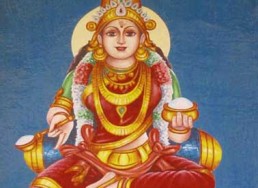Annabrahma Rasovishnu
भोक्ता देवो महेश्वरः ।
एवम् ज्ञक्त्व तु यो भुन्क्ते
अन्न दोषो न लिप्यते॥
bhoktā devo maheśvaraḥ .
evam jñaktva tu yo bhunkte
anna doṣo na lipyate ..
Food is Lord Brahmā, the essence is Lord Vishnu, and the one who partakes is the great Lord Shiva. One who eats with this understanding is not tainted by any fault of eating.
annabrahmā – Food is Lord Brahmā
rasoviṣṇuḥ – The essence (taste) is Vishnu
bhoktā – The partaker
devaḥ – The deity (Lord)
maheśvaraḥ – The great Lord Shiva
evam – Thus
jñaktvā – Knowing, understanding
tu – But
yaḥ – Whoever
bhunkte – Eats
anna doṣaḥ – Faults of food (negative effects of food)
na lipyate – Do not affect, are not tainted

Description
Translation:
Food is Lord Brahmā, the essence is Vishnu, and the one who partakes is the great Lord Shiva. One who eats with this understanding is not tainted by any fault of eating.
This verse is a traditional mantra often recited before meals, recognizing the divine presence in the food, the essence of the food, and the one who consumes it. It reflects a holistic understanding of divinity being present in every aspect of nourishment.
Meaning and Interpretation:
- annabrahmā – Food is Lord Brahmā.
The verse begins by declaring that Anna (food) is Lord Brahmā, the creator aspect of the divine trinity, emphasizing the creative energy of food. - rasoviṣṇuḥ – The essence (taste) is Vishnu.
The Rasa or essence of the food is considered to be Vishnu, the preserver of the universe. This suggests that the nourishing quality and essence of food are imbued with Vishnu’s sustaining energy. - bhoktā devo maheśvaraḥ – The one who partakes is Lord Shiva.
The act of consuming the food is associated with Maheśvara (Lord Shiva), the great God who transforms and absorbs. This points to the role of Shiva as the one who takes in and transforms the energy from the food. - evam jñaktvā tu yo bhunkte – Whoever eats with this knowledge.
One who eats with the understanding that food is Brahmā, its essence is Vishnu, and the one who consumes is Shiva, approaches the act of eating with mindfulness and reverence. - anna doṣo na lipyate – Is not tainted by the faults of eating.
When eating is done with this spiritual awareness, it transcends any negative implications or attachments, and the person is not affected by the faults typically associated with consumption.
Understanding for Devotees:
- Sanctity of Food:
This verse encourages a devotee to regard food as sacred, treating every meal as an opportunity to connect with the divine. By recognizing Brahmā, Vishnu, and Shiva in the process of eating, a simple act becomes a profound spiritual experience. - Mindful Eating:
Eating with the awareness that the entire process—from the food itself to its digestion—is part of the divine cosmos helps devotees engage in mindful eating, ensuring that the act is done with gratitude and reverence. - Spiritual Purification:
Consuming food with such knowledge purifies the individual, as they are not burdened by the negative consequences of overindulgence, attachment, or the potential impurities in food. - Unity of the Divine:
The verse encapsulates the idea that all aspects of life, including food, its essence, and the act of eating, are intertwined with the divine presence. It reinforces the non-dualistic belief that the divine is present in every element of existence.
Meditation on the Verse:
When reciting this verse before meals, devotees can meditate on the presence of Brahmā, Vishnu, and Shiva in the food and the act of eating. This reflection can help cultivate a deeper sense of gratitude, reminding one that all nourishment comes from the divine and should be treated with the utmost respect and awareness.
Also see Annapurna Stotram.
Other Annapurna Shlokams
Aham Vaishvanaro Bhutva
Becoming the fire of life, I enter into the bodies of all creatures and mingling with the upward and downward breath I digest the four kinds of food (masticated, drunk, licked, sucked).
Annapurna Stotram
Annapurna is the goddess of food and nourishment. She is a form of Parvati, the inseparable shakti of Lord Shiva. Anna is translated as "food" and "grains" and purna means "full" or "complete". Annapu
Annapurne Sadapurne
Salutations to Mother Annapoorna: O Mother Annapoorna, You who are always full (with the gift of Food and Blessings), You who are the beloved of Shankara (Shiva), O Mother Parvati, Please grant me the
Brahmarpanam Brahma Havih
Any means of offering is Brahman, the oblation is Brahman, the fire in which the offering is made is Brahman, and the one who offers is Brahman. Such a person who abides in Brahman indeed gains Brahma
Annabrahma Rasovishnu – Annapurna – In Sanskrit with English Transliteration, Translation and Meaning. Commentary for selected Shlokams.

